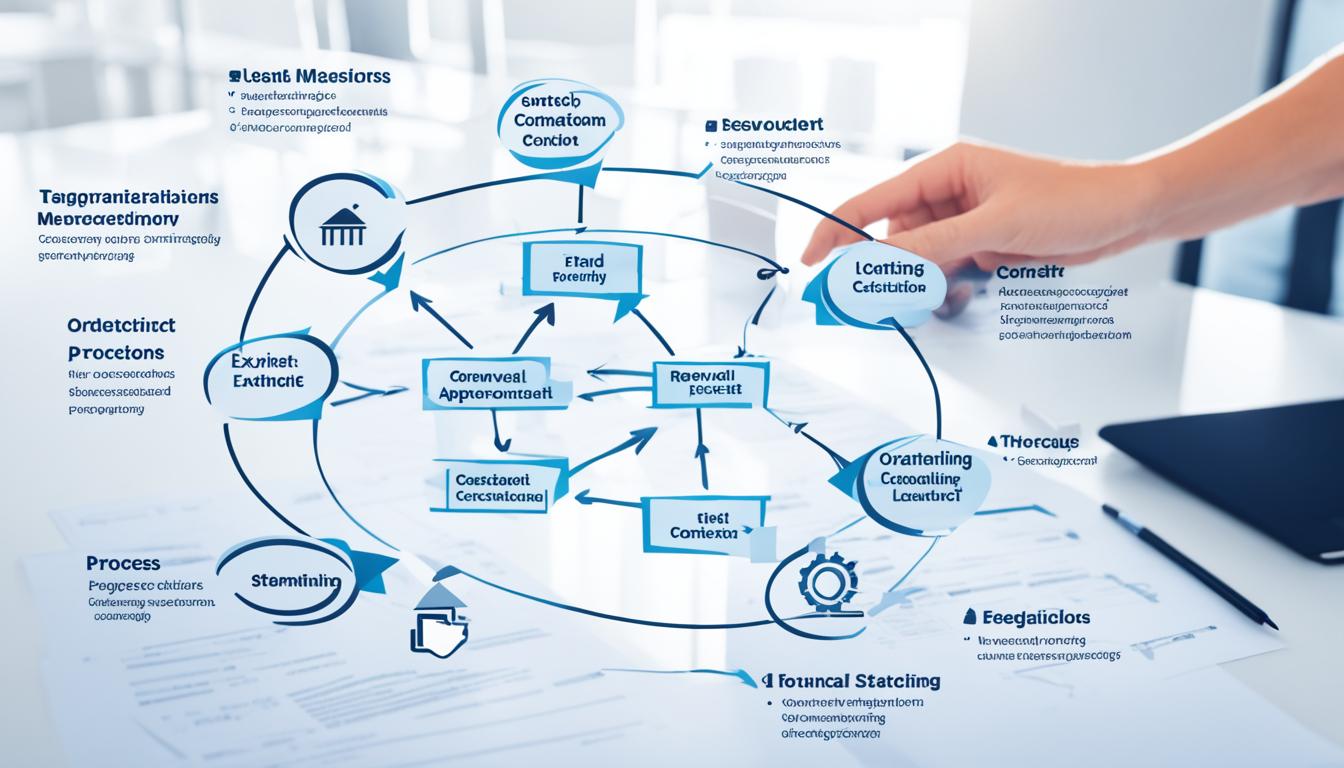Have you ever thought about how a single mistake in a business deal could harm your reputation? In today’s fast business world, contractual agreements are key to managing your reputation. They’re more than legal papers; they protect your brand’s honor and build trust with customers.
These agreements are vital from the start to the end of business relationships. They make sure everything is clear, controlled, and follows the rules. This is key to keeping a good reputation1.
It’s vital to have clear contract language to avoid misunderstandings2. Being clear and checking regularly helps spot any issues. This way, businesses can get the most from their agreements and follow the law.
Managing contracts well isn’t just about avoiding legal trouble. It’s about creating a strong defense for your brand’s reputation3. With strong contract management, companies can lower financial risks, improve security, and protect their good name.
Key Takeaways
- Contractual agreements are key to protecting your brand’s honor
- Clear contract language cuts down on misunderstandings
- Regular checks keep you in line with agreed terms
- Good contract management shields against bad reputations
- Contracts are important at all stages of business relationships
- Following contracts is key to keeping trust
Understanding Contract Management in Reputation Building
Contract lifecycle management (CLM) is key to building and keeping a company’s good name. It means managing agreements with clients, partners, and suppliers from start to finish. This includes storing, organizing, negotiating, and analyzing contract data.
A strong CLM system helps improve performance and lowers risks. Companies without the right tech struggle with managing contracts. They face problems like limited online access and not knowing what’s in contracts4. To fix this, we suggest having one place for all contracts and standard negotiation steps4.
Using contract management software makes things more efficient and keeps contracts in line with the law5. It offers templates for making contracts the same way, a central spot for finding contracts fast, and tracking changes in contracts5. These tools cut down on time and mistakes in making contracts.
Managing vendors and VCLM gets better with AI in modern CLM tools. These technologies check how well suppliers do, keep an eye on law rules, and help with scheduling4. AI can also guess what might happen, spot risks, and look at contracts in real-time to stop problems before they start5.
Good contract management leads to better vendor relationships by making sure everyone sticks to the agreement5. It’s important to set up how well things should go, check if rules are followed, and keep strong ties with suppliers for good contract management6. By focusing on these, we can use CLM to build a strong reputation and succeed in the long run546.
Contractual Agreements in Reputation Management: Key Elements
Contractual agreements are crucial for managing a brand’s reputation. We’ll look at what makes these agreements strong defenses for a brand’s image.
Starting with clear contract terms is key. These terms should cover legal duties, how well things will perform, and follow rules. This way, companies can dodge misunderstandings that could hurt their reputation.

Having financial stability clauses is vital too. These parts make sure everyone can meet their duties. This lowers the chance of breaking a contract, which could hurt how people see the company.
It’s also important to have ways to solve disputes. By setting up clear steps for disagreements, companies can fix problems fast and keep their good name.
“A well-crafted contract is like a sturdy fence – it protects your reputation from unexpected intrusions.”
A strong reputation is very important. Research shows that 95% of customers trust well-known companies, and 87% have changed their mind about buying something because of a change in how they see a company7.
| Contract Element | Impact on Reputation |
|---|---|
| Clear Terms | Reduces misunderstandings |
| Financial Stability Clauses | Ensures fulfillment of obligations |
| Dispute Resolution | Allows private conflict resolution |
Checking contracts regularly is a must. It helps spot chances to renew or update agreements and keeps them in line with new laws. This helps avoid issues that could harm the reputation early on.
By focusing on these key points, companies can use contractual agreements as strong tools for managing their reputation. A good contract not only guards business interests but also builds trust with everyone involved, helping with a positive online image8.
Legal Contracts as a Shield for Brand Reputation

Legal contracts are key to protecting a brand’s good name. They help manage risks and offer legal safety. Most business deals, 70-80%, need written agreements to set clear expectations and lower risks9.
These contracts guard against theft of ideas and keep data safe. This is vital in our digital world where mistakes can cause big problems. For example, ignoring GDPR can lead to fines of up to €20 million or 4% of a company’s yearly sales10.
Using software to manage contracts makes things smoother and lowers risks. It can make handling contracts 80% faster and help businesses work better11. This speed is important to avoid delays that could slow down progress and harm the brand.
Keeping contracts in line with the law is key to a strong brand image. Without good management, businesses could lose 9% of their sales and about 40% of a contract’s value9. To avoid these problems, companies should have strong review processes. This ensures fair terms and clear duties for everyone.
| Contract Management Benefits | Impact on Brand Reputation |
|---|---|
| Clear terms and expectations | Reduced misunderstandings and disputes |
| Risk mitigation strategies | Enhanced stakeholder trust |
| Compliance assurance | Avoidance of legal penalties and reputation damage |
| Efficient processing | Improved business relationships and reliability |
By focusing on good contract management, businesses can protect their reputation from threats. This careful planning keeps trust with stakeholders and leads to success over time in a complex business world.
Best Practices for Contract Management in Reputation Protection
Effective contract management is key to keeping a company’s good name. Over 85% of contract managers use checklists to manage contracts well12. Let’s look at some top ways to keep your brand safe through good contract management.

First, it’s vital to have a single place for all contracts. This digital way makes finding and looking up agreements easy. Sadly, less than half of companies check their contract partners’ legal backgrounds well12. A single spot for all contracts helps fix this by giving fast access to needed info.
Using contract management software changes the game. It makes handling deadlines and tasks easier and cuts down on mistakes. This tool lets you deeply check each contract, spot key dates, and see crucial parts. About 60% of companies make sure someone makes the final call on contracts12.
Checking and reviewing contracts often is key. Only 25% of businesses always check their contracts after they’re signed12. This helps spot problems and make sure you’re following the contract rules. It’s also important for watching how contracts are doing.
“Contract management is a strategic investment that protects businesses from various risks, safeguarding financial stability and operational efficiency.”
Using electronic signatures makes signing contracts easier and safer. This, along with strong data security, keeps user data safe and follows the law13.
| Best Practice | Impact on Reputation |
|---|---|
| Centralized Contract Repository | Improves transparency and accessibility |
| Contract Management Software | Reduces errors and enhances efficiency |
| Regular Audits | Ensures compliance and identifies issues early |
| Electronic Signatures | Enhances security and streamlines processes |
By following these best practices, companies can make their contract management better. This helps protect their reputation, makes operations run smoother, and lowers risks from contracts.
Conclusion: Leveraging Contracts for Long-term Reputation Success
Contracts are more than legal papers in business. They help us build and protect our good name. By managing contracts well, we make safer partnerships and increase accountability. A detailed look at contracts helps us find problems, reduce risks, and get ahead14.
Reviewing contracts is key to meeting everyone’s needs and avoiding confusion. It means checking terms, prices, deadlines, and rules14. By doing this, we can catch risks early, like legal or financial ones. This way, we keep our reputation strong and our finances better15.
For lasting success, we need a solid plan for contracts. It’s not just a one-time thing, but a constant effort to get better16. By learning from past deals, we can do better in future talks. This leads to better terms and stronger partnerships. Open communication with customers and stakeholders also boosts our image15. In the end, good contract management does more than protect our name. It helps us achieve our business goals and build lasting success.
FAQ
What is the role of contractual agreements in reputation management?
What is contract management and why is it important?
What are the key elements of contractual agreements in reputation management?
How do legal contracts serve as a shield for brand reputation?
What are some best practices for contract management in reputation protection?
How can leveraging contracts contribute to long-term reputation success?
Source Links
- What is Contract Compliance and Why is it Important? – https://www.gatekeeperhq.com/blog/what-is-contract-compliance-and-why-is-it-important
- The Essential Guide to Contract Compliance & Risk Management – https://www.malbek.io/blog/the-essential-guide-to-contract-compliance-and-risk-management
- Mitigating Business Risk Through Contract Management – https://ironcladapp.com/journal/contract-management/business-risk/
- Contract Lifecycle Management Explained – https://sievo.com/blog/contract-lifecycle-management-key-stages-and-best-practices
- Contract Management Features – BuildOps – https://buildops.com/commercial-construction/contract-management-features/
- What are the most effective ways to evaluate contract management processes? – https://linkedin.com/advice/0/what-most-effective-ways-evaluate-contract-ifb4c
- Reputation PR: Strategies & Management Tips w/ Examples – https://prowly.com/magazine/reputation-pr/
- A Simple Guide to Reputation Management | SafetyCulture – https://safetyculture.com/topics/reputation-management/
- Navigating Contract Compliance: Definition, Tips & Best Practices – Pandadoc – https://www.pandadoc.com/blog/contract-compliance/
- Contract Management risks and how to avoid them – https://www.wolterskluwer.com/en-gb/expert-insights/contract-management-risks
- Efficient Contract Review for Business Contracts – https://ironcladapp.com/journal/contract-management/contract-review/
- Effective Contract Management – Learn 6 key Contract Strategies – https://www.contractlogix.com/contract-management/6-strategies-for-effective-contract-management
- Mitigating Business Risk Through Contract Management – https://ironcladapp.com/journal/contract-management/business-risk
- Contract Analysis – Gain & Leverage Insight from Contracts – https://www.malbek.io/blog/contract-analysis-ai
- Reputation Management Case Studies: Big Brand Turnarounds – https://bryghtpath.com/reputation-management-case-studies/
- 10 Questions to Ask Your Reputation Management Company – https://www.reputationmanagement.com/blog/questions-to-ask-your-reputation-management-company/

